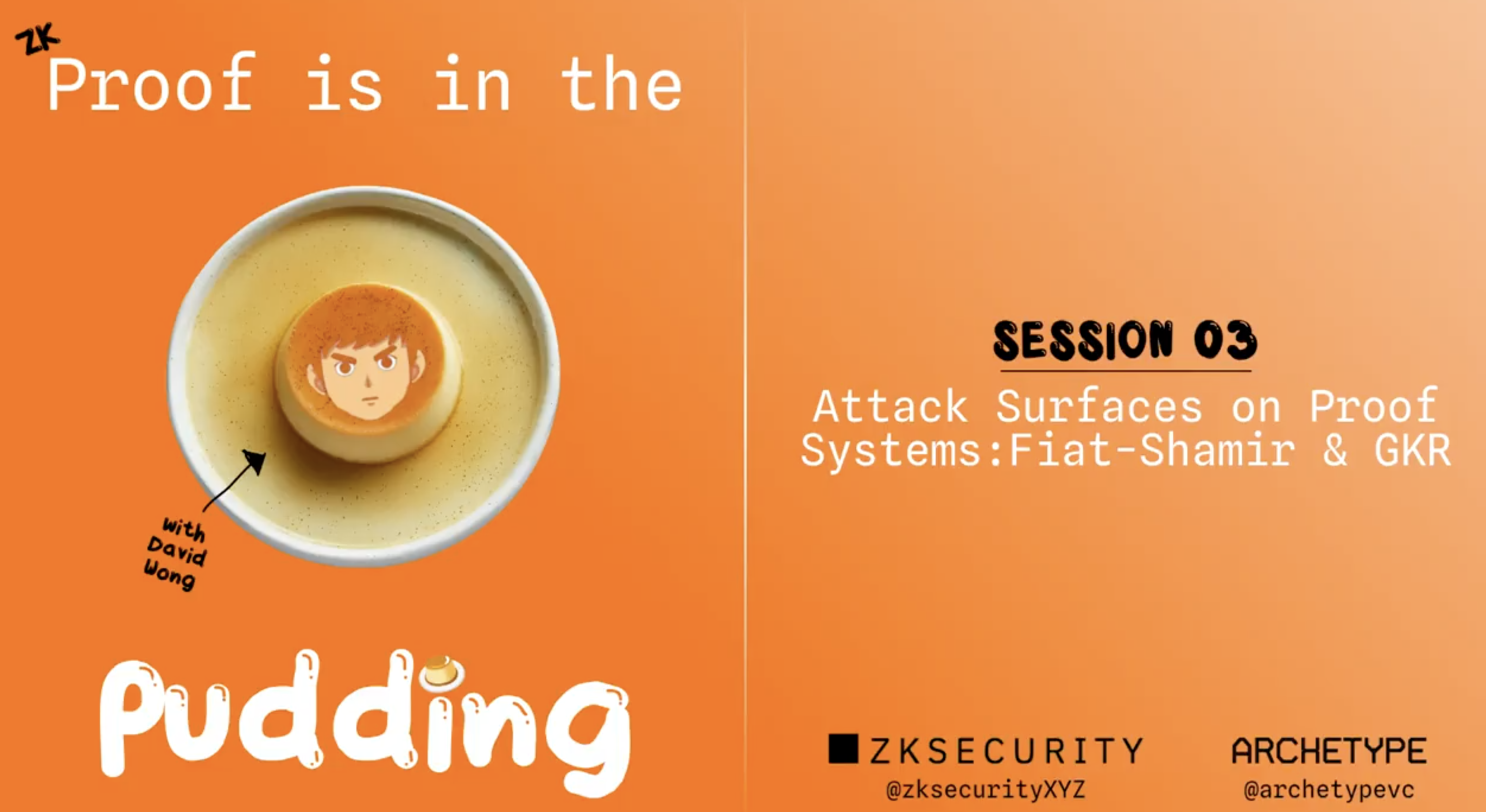
In this third whiteboard session in partnership with Archetype, we explain how a recent paper on Fiat-Shamir security and the GKR protocol works.

In this third whiteboard session in partnership with Archetype, we explain how a recent paper on Fiat-Shamir security and the GKR protocol works.
zkSecurity offers auditing, research, and development services for cryptographic systems including zero-knowledge proofs, MPCs, FHE, and consensus protocols.
Learn more →Think you have what it takes to join zkSecurity? We're raising the bar with a second challenge! Now candidates must complete both zkBank and our new Curve Machine challenge to prove their skills across the full spectrum of ZK security. Are you ready to take on both challenges?
A new interactive tutorial on Sumcheck, Multilinear Extensions, and HyperPlonk with complete SageMath implementations and exercises. Go beyond the theory and understand how these protocols actually work by implementing them yourself.
In this blog post, we explore how to optimize the sumcheck protocol, particularly when working with values in a small field and randomness from a large field, as often needed in zkVMs. We introduce various algorithms aimed at reducing expensive operations, focusing on minimizing large multiplications. Starting from using simple evaluation tables to more sophisticated techniques like precomputing accumulators and leveraging Lagrange interpolation, we demonstrate how to efficiently organize computations to speed up proving times. Readers will gain insights into handling arithmetic operations within the sumcheck protocol and learn about optimizing specific cases in zero-knowledge proofs.
We audited Reclaim protocol's ChaCha20 circuits, diving deep into bit-level operations for a secure and efficient design. After a few iterations, we switched from a word-based to a bit-focused circuit approach, achieving a 10% enhancement in performance and size. We used Circom for implementation, with a focus on Groth16 system constraints. Our findings led Reclaim to revamp their strategy, honing in on bitwise logic for an effective flow without costly re-encodings. Curious about the technical journey and the final audit insights? We’ve got the details covered!
We recently had the pleasure of auditing Renegade's circuits and smart contracts, and it was a great experience. Over three weeks, our team explored their top-notch code and documentation, with the Renegade team providing awesome support throughout. Curious how it all went? Dive into our full report for the inside scoop!
We recently teamed up with Celo for an in-depth security audit of the Self project, exploring its innovative approach to on-chain identity using biometric passports and zero-knowledge proofs. During our three-week dive, we examined everything from cryptographic primitives to smart contract architecture and a unique proof delegation system using AWS Nitro Enclaves. The Celo team impressed us with their commitment and responsiveness, and we collaborated on refining the system with strategic improvements. Curious about the nitty-gritty details and our insights? Check out the full report!
We've teamed up with some of the top minds in academia and industry to dive deep into the world of zero-knowledge proofs (ZKPs) and their vulnerabilities. Our new paper catalogues hundreds of ZK vulnerabilities, breaking down their root causes and offering strategies to sidestep these pitfalls. By digging into real-life SNARK implementations, we aim to bolster the security of these cutting-edge systems with actionable insights and recommendations. Curious about what makes ZKPs tick and how to keep them secure? You might find this study just what you need!
We're gearing up for this year's ZPrize competition, where we'll be hosting the High Throughput Signature Verification category. This challenge is all about creating the most efficient signature verification circuit using Aleo's Varuna proof system. Participants will work with ECDSA on the Bitcoin and Ethereum curve and the Ethereum hash function, keccak256. It's a great chance to dive into some of the hottest problems in arithmetic circuits and optimize cryptographic algorithms. If you're curious about pushing the boundaries in ZK, join us and share your feedback on our prize specification through our Discord channel.
Join our cofounder David Wong on the latest zk podcast as he dives into his compelling journey through cryptography, from his early days as a security consultant to his pivotal roles in major projects like Facebook's crypto initiatives and Mina. Get an insider's view on how we approach auditing in a Zero Knowledge context, the common pitfalls in ZK code, and how these insights shape our work. It's an engaging and informative chat for anyone fascinated by the world of cryptography and ZK technology!